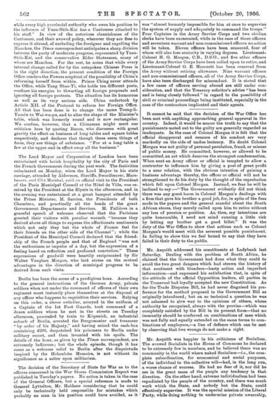It cannot be said that the decision of the War
Office has been met with anything approaching general approval in the country. Indeed, it would be nearer the truth to say that the punishments meted out to the guilty are generally regarded as inadequate. In the ease of Colonel Morgan it is felt that the official disapproval and censure of his conduct err very markedly on the side of undue leniency. No doubt Colonel Morgan was not guilty of personal peculation, fraud, or misuse of public money. He committed, however, or allowed to be committed, an act which deserves the strongest condemnation. When next an Army officer or official is tempted to allow a contractor to influence him by giving a post of great profit to a near relation, with the obvious intention of gaining a business advantage thereby, the officer or official will not be strengthened to do his duty by the thought of the reprobation which fell upon Colonel Morgan. Instead, we fear he will be inclined to say :—" The Government evidently did not think there was any great harm in Colonel Morgan's dealings with a firm that gave his brother a good job, for, in spite of the fuss made in the papers and the general scandal about the South African stores, they merely called upon him to retire without any loss of pension or position. As, then, my intentions are quite honourable, I need not mind running a little risk by letting my brother get a good billet." It was the duty of the War Office to show that actions such as Colonel 3tforgan's would meet with the severest possible punishment. In failing to show this we feel bound to say that they have failed in their duty to the public.














































 Previous page
Previous page